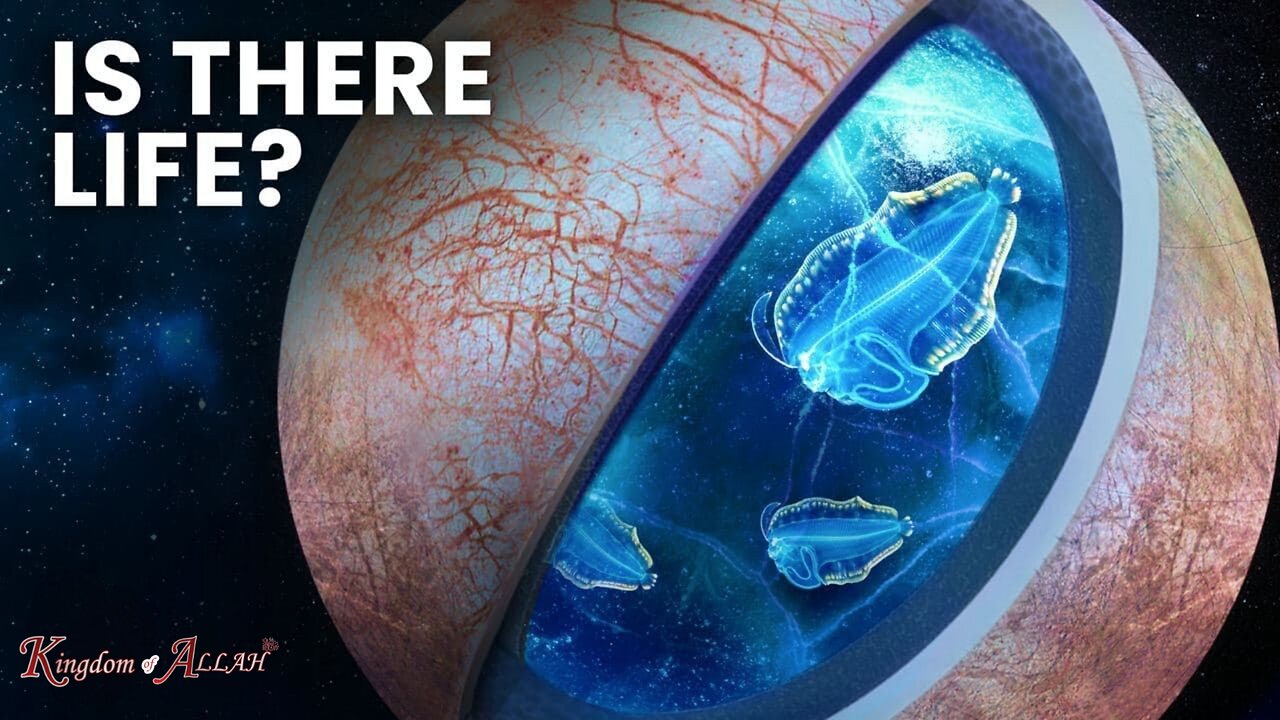Premium Only Content

Alien Life Found In Solar System | Science Series | KINGDOM of ALLAH
Alien Life Possibly Found In Solar System
Subscribe
https://www.youtube.com/@kingdomOfAllah.Official?sub_confirmation=1
Islam and science
Science and Islam are intimately linked. Islam not only places a high premium on science but positively encourages the pursuit of science. Indeed, Islam considers science as an essential prerequisite for human survival.
This sounds odd. We normally think of religion as inimically hostile to science. Wasn’t there a long and protracted war between science and Christianity? Did the Church not prosecute Galileo? But this ‘war’ between ‘science’ and ‘religion’ was purely a western affair. There is no counterpart of such mutual hostilities in Islam.
On the contrary, Islam encouraged the pursuit of scientific knowledge right from its inception. The Prophet Muhammad – who himself could not read or write – emphasised that the material world can only be understood through scientific inquiry. Islamic culture, he insisted, was a knowledge based culture. He valued science over extensive worship and declared: ‘An hour’s study of nature is better than a year’s prayer’. This is why he directed his followers to ‘listen to the words of the scientist and instil unto others the lessons of science’ and ‘go even as far as China in the quest of knowledge’.
The Quran, which the Muslims believe to be the very Word of God and clearly distinguish it from the words of Prophet Muhammad, places immense emphasis on scientific knowledge. The first Quranic word revealed to Muhammad is ‘Read’. It refers, amongst other forms of readings, to reading the ‘signs of God’ or the systematic study of nature. It is a basic tenet of Muslim belief that the material world is full of signs of God; and these signs can only be deciphered through rational and objective inquiry. Almost one third of the Quran is devoted to the praise of scientific knowledge, objective inquiry and serious study of the material world. ‘Acquire the knowledge of all things’, the Quran advises its readers; and pray: ‘God increase me in my knowledge’. One of the most frequently cited verses of the Quran reads: “Surely in the heavens and earth there are signs for the believers; and in your creation, and the crawling things He scatters abroad, there are signs for a people having sure faith, and in the alternation of night and day, and the provision God sends down from heaven, and therewith revives the earth after it is dead, and the turning about of the winds, there are signs for a people who understand” (45:3-5).
So science and Islam are, and should be, natural bed fellows. It was the religious impulse that propelled science in Muslim civilisation during the classical period, from the eighth to the fifteenth centuries. It is the neglect of science that has plunged the contemporary Muslim world in poverty and underdevelopment. The revival of Islam and the consequent emergence of a modern Islamic culture require a serious infusion of the scientific spirit in Muslim societies.
We can see a clear demonstration of the close relationship between Islam and science in early Muslim history. The initial drive for scientific knowledge was based on religious requirements. The need for determining accurate time for daily prayers and the direction of Mecca from anywhere in the Muslim world, establishing the correct date for the start of the fasting month of Ramadan and the demands of the lunar Islamic calendar (which required seeing the new moon clearly) led to intense interest in celestial mechanics, optical and atmospheric physics, and spherical trigonometry. Muslim laws of inheritance led to the development of algebra. T
The most famous library was the ‘House of Wisdom’, founded in Baghdad by the Abbasid Caliph al-Mamun, which played a decisive role in spreading scientific knowledge throughout the Islamic empire. In Spain, the library of Caliph Hakam II of Cordoba had a stock of 400,000 volumes. Similar libraries existed from Cairo and Damascus to as far off as Samarkand and Bukhara. The first university in the world was established at the Al-Azhar mosque in Cairo in 970. It was followed by a host of other universities in such cities as Fez and Timbuktu. Like universities, hospitals – where treatment was mostly provided free of charge – too were institutions for training and theoretical and empirical research. The Abodi hospital in Baghdad and the Kabir an-Nuri hospital in Damascus acquired world-wide reputations for their research output.
The Universe seems to be endless with no signs of life. While a lot of us might believe there is no extra-terrestrial life out there, no one can prove otherwise. The question 'are we alone? ’Has always been an interesting one, and there are many scientists that believe there could be life outside our solar system. And recently, scientists made an incredibly shocking discovery when looking at the Venus, Jupiter and Saturn...
-
 25:29
25:29
DeVory Darkins
1 day ago $9.59 earnedTrump makes SHOCKING announcement as MSNBC MELTS DOWN in furious rant
26.8K76 -
![POTUS+CENSUS+SCOTUS: START [D] Power Implosion | Russian Spec_Ops Seize Adrenochrome Cargo](https://1a-1791.com/video/fww1/59/s8/6/-/w/O/-/-wO-y.0kob.jpg) 1:02:54
1:02:54
QNewsPatriot
14 hours agoPOTUS+CENSUS+SCOTUS: START [D] Power Implosion | Russian Spec_Ops Seize Adrenochrome Cargo
12.2K26 -
 LIVE
LIVE
LFA TV
2 hours agoLFA TV ALL DAY STREAM - WEDNESDAY 8/13/25
5,165 watching -
 1:21:38
1:21:38
JULIE GREEN MINISTRIES
3 hours agoTHE FDA WILL BE EXPOSED ON HOW THEY HAVE BEEN ALLOWED TO POISON YOU
69.1K169 -
 1:20:21
1:20:21
Game On!
18 hours ago $2.47 earnedIT'S MY BIRTHDAY! Let's Talk SPORTS!
18.2K1 -
 8:49
8:49
Faith Frontline
16 hours agoCharlie Kirk DESTROYS Fist Fight Challenge With ONE Epic Comeback
16K23 -
 11:26
11:26
Nicholas Bowling
20 hours ago $3.73 earnedJehovah’s Witnesses Feel ATTACKED by the Bible | Houston Recap
26K7 -
 2:01:24
2:01:24
BEK TV
1 day agoTrent Loos in the Morning - 8/13/2025
17.8K1 -
 4:02:49
4:02:49
The Bubba Army
1 day agoTRUMP CRUSHES CARTELS - Bubba the Love Sponge® Show | 8/13/25
38.4K14 -
 13:09
13:09
AndresRestart
17 hours ago $0.71 earnedLooks Like The Mario 40th Anniversary Nintendo Direct Is On The Way!
19K1